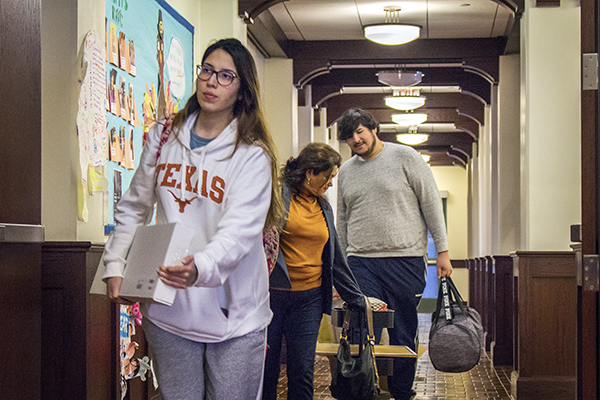Editor’s note: This story is part of The Daily Texan’s coverage of how coronavirus concerns are affecting UT-Austin. Read the rest of our coverage here.
Comprising a mere 10.6% of the student body, out-of-state students at UT often find themselves left out of the conversation.
When UT President Gregory Fenves announced the closure of residence halls, he told students they should prepare to move out as soon as possible. However, many out-of-state students were unable to return to campus as they had already returned home for spring break.
While some optimistic students hope to return for their belongings in May, others said they will have to abandon what they left in their dormitories.
Hannah Kuper is an undeclared communication freshman from Philadelphia, Pennsylvania. Kuper said she had already gone home for spring break when she received word that residence halls would be closing.
“After the email, my parents were like, ‘We don’t know the next time we can get you there,’” Kuper said. “‘It’s so dangerous right now to fly. We’re not doing that for just some of your clothes.’”
Kuper said she was glad she decided to ship a small box home before leaving, but the majority of her belongings are still on campus and she has no way to come back for them.
“I don’t know what I’m going to do without any of my clothes for five months,” Kuper said. “I guess I’m going to have to get a whole new wardrobe.”
Adam Kaplan, a radio-television-film freshman, hoped to return to campus and collect his things in May, but his parents aren’t thrilled at the prospect of him leaving his home in New York City any time soon.
“My parents are kind of panicky,” Kaplan said. “They do want me to go back and get my stuff, but I think I want to get my stuff more than they do. It’s really annoying to know how much I have back there.”
Justin Jaskowiak, director for apartments, occupancy and conferences at University Housing and Dining, said students who can’t return to Texas can hire a third party to assist them with moving out or storing their belongings.
“It doesn't necessarily matter what the relationship between the resident and the third party looks like, as long as the resident has approved them to go into their space and collect their belongings,” Jaskowiak said.
Jaskowiak said UHD will grant third parties access to the building and the dorm room and that students should later mail their key to the University and include their name and UT EID.
If students need financial assistance, Jaskowiak said they should contact Student Emergency Services.
Any items left in student dorms after May 20 will be donated to the Campus Environmental Center’s Trash to Treasure program, Jaskowiak said, but UHD will contact students and alert them before they do so. Jaskowiak said this is the same procedure carried out at the end of each long session.
Jacob Fridakis, European studies and international relations and global studies freshman, is also from New York City, where the number of COVID-19 cases was nearly 45,000 as of publication. Numerous announcements advising against nonessential domestic travel and recommending those traveling to or from NYC self-quarantine have put Kaplan and Fridakis in a particularly tight spot.
“My mom's involved with the Texas Parents Association, and they don't know what to do (about housing) because they’re not letting their kids fly back,” Fridakis said.
Fridakis said he plans on having a friend pack and store his things until he’s able to come back to Texas. If he didn’t have that option, Fridakis said he would take advantage of the accommodations being made by UHD.
“The only other option is to wait til May and hope the situation gets better, but that’s obviously a risk and I could easily end up in the same spot I am now,” Fridakis said. “So I think it’s a good solution.”
Despite out-of-state students being a minority of the student population, Kuper said she wishes UT would address the questions of the entire student body, not just in-state students.
“(They need to) keep in mind the interests of out-of-state students, because it feels like a lot of the time, we’re forgotten,” Kuper said. “In emails, they could have a section for out-of-state students that says, ‘Here’s what you need to do, here are the options available.’”















